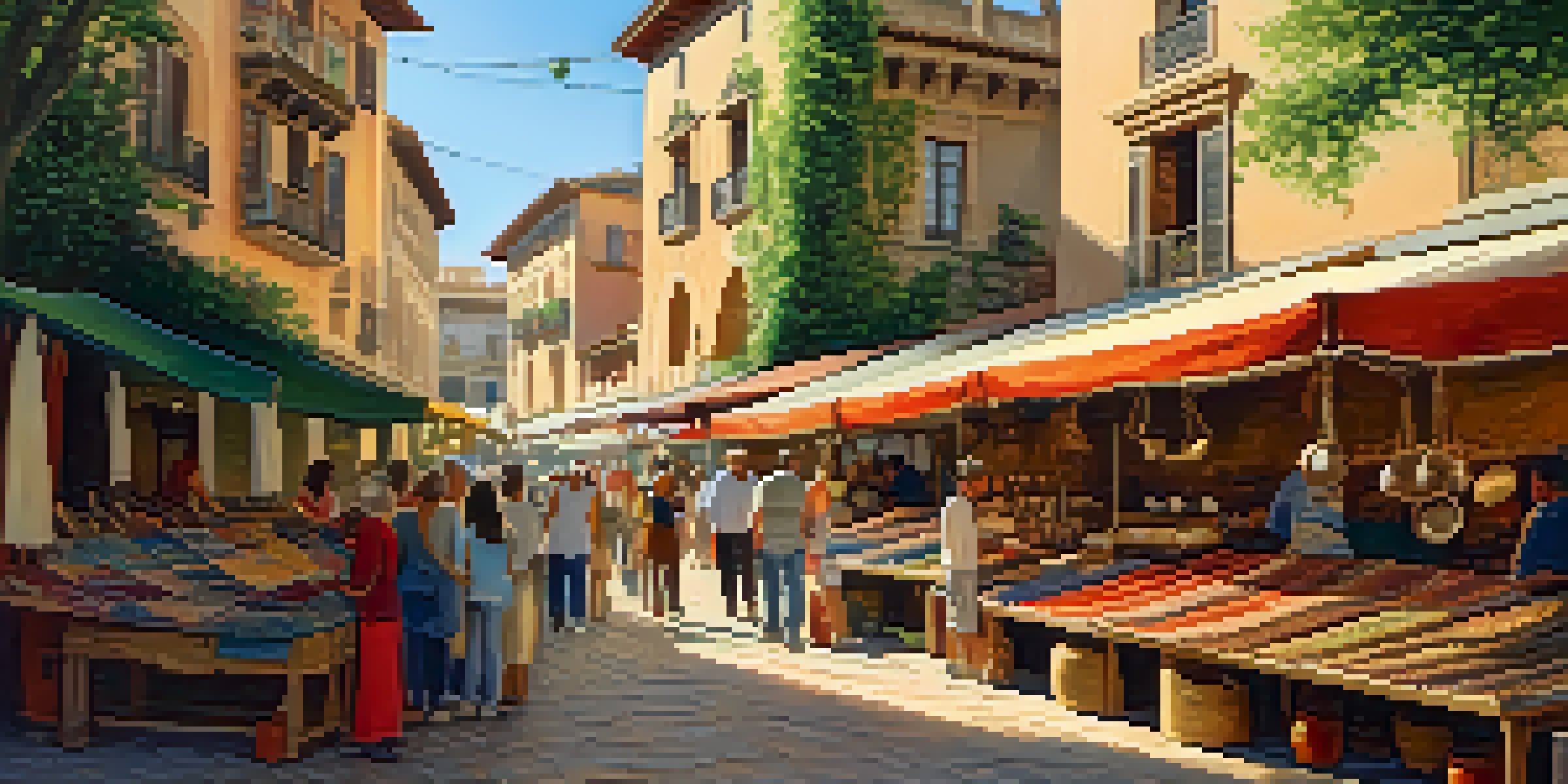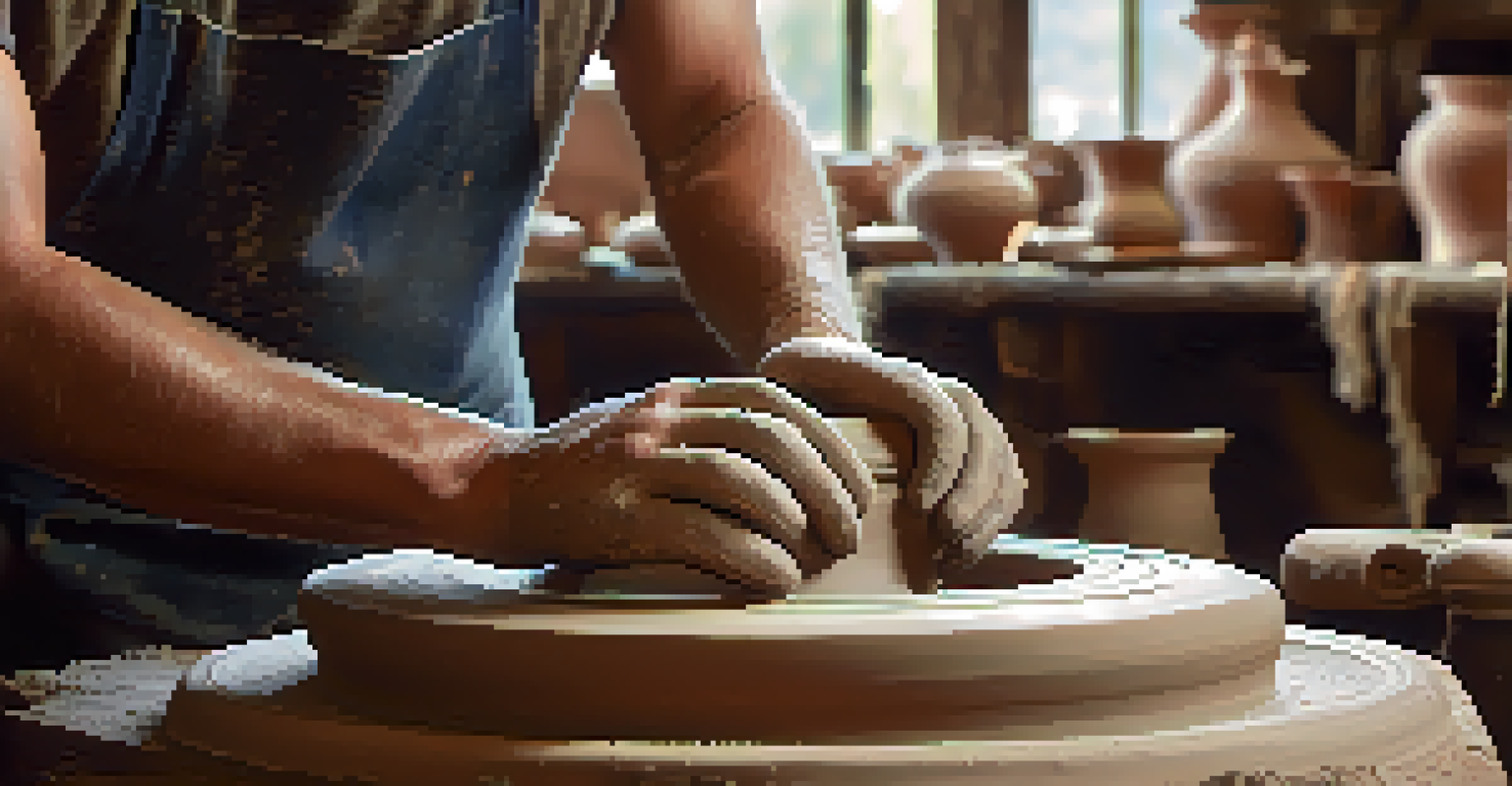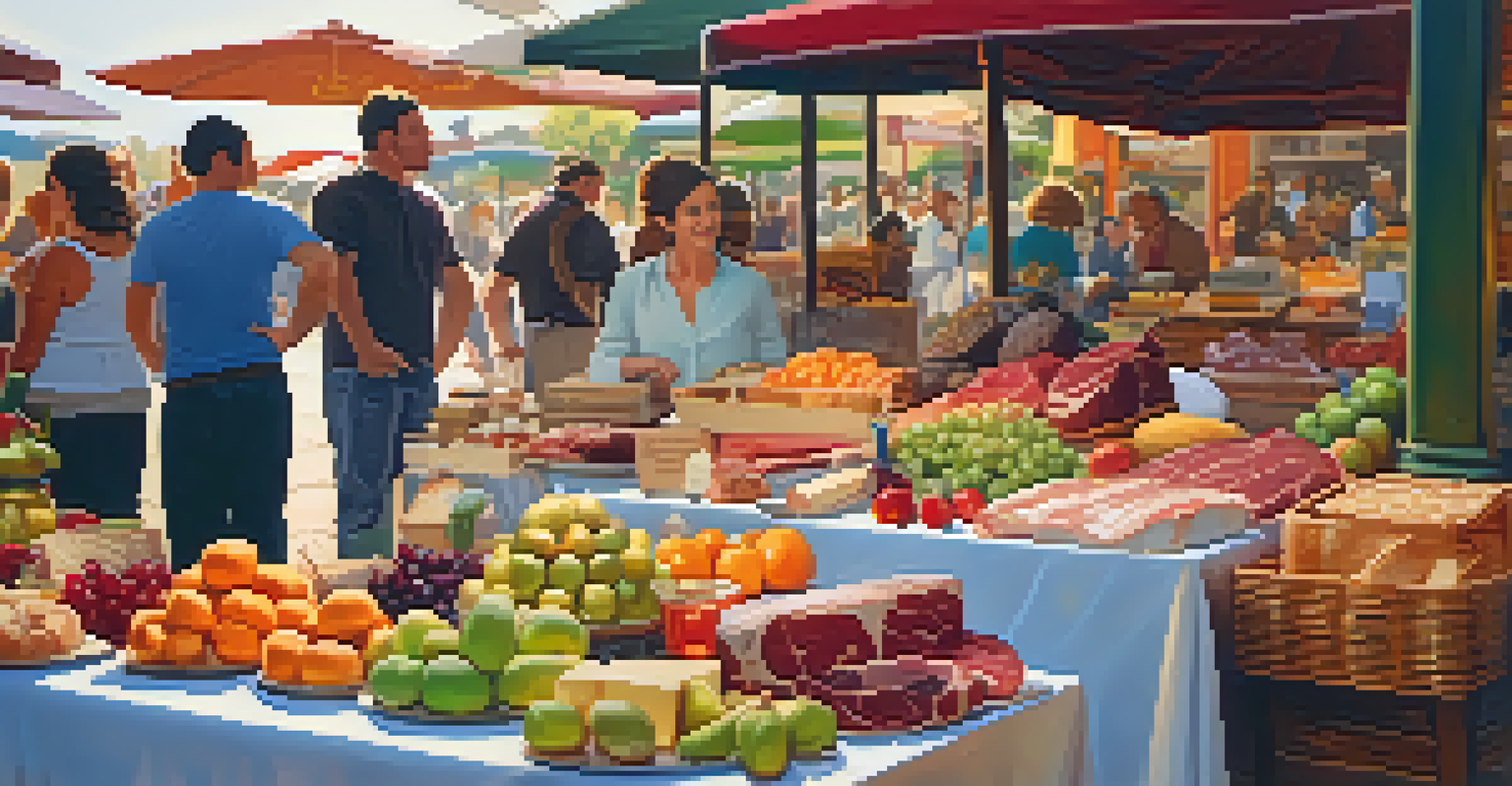Artisan Markets in Spain: A Journey Through Local Traditions

The Heartbeat of Spanish Culture: Artisan Markets
Artisan markets in Spain serve as vibrant hubs of culture and community, reflecting the rich history of the regions they inhabit. These markets are not just places to shop; they are gathering spots where locals and visitors alike can engage with age-old traditions. Each market tells a unique story through its crafts, food, and the artisans who create them, inviting everyone to experience a slice of Spanish life.
Art is not what you see, but what you make others see.
Walking through these markets, you’ll find an array of handmade goods ranging from pottery and textiles to handcrafted jewelry and gourmet foods. This diversity showcases the unique talents of local artisans, many of whom have honed their skills over generations. It’s a wonderful reminder of the creativity and passion that fuel these traditional crafts.
Visiting an artisan market is more than just a shopping trip; it’s an opportunity to connect with the people and stories behind the products. Whether you’re chatting with a potter while they shape clay or tasting homemade jam from a farmer, these interactions deepen your appreciation for Spanish culture.
Exploring Unique Markets Across Spain
Spain boasts a variety of artisan markets scattered throughout its diverse regions, each offering distinct flavors and crafts. For instance, the Mercado de San Miguel in Madrid is renowned for its gourmet food products, while the Mercat de Sant Josep de la Boqueria showcases fresh produce and local delicacies. Each market presents a unique opportunity to experience the local culture through its specific offerings.

In Andalusia, the markets often feature vibrant textiles and traditional ceramics, reflecting the region's Moorish influences. Meanwhile, in Galicia, you can find exquisite seafood products, crafted by local fishermen and artisans who have perfected their trades over centuries. This variation highlights how local traditions seep into the crafts available in each area.
Artisan Markets Reflect Spanish Culture
These vibrant hubs showcase local crafts, foods, and traditions, inviting visitors to engage with Spanish life.
As you travel from market to market, you’ll discover the rich tapestry of regional specialties that make Spain so unique. Every corner of the country has its own artisan treasures waiting to be explored, making each visit a new adventure in cultural discovery.
The Soul of Spanish Crafts: Artisan Techniques
One of the most captivating aspects of artisan markets in Spain is the traditional techniques used by artisans. Many of these methods have been passed down through generations, preserving the integrity of the craft. For example, the intricate process of crafting ceramics in Talavera de la Reina showcases a blend of artistry and skill that is truly mesmerizing.
Every piece of craftsmanship is a reflection of the culture from which it comes.
These traditional techniques often require years of practice to master, reflecting a deep commitment to the craft. When you purchase an item from an artisan, you’re not just buying a product; you’re acquiring a piece of history and cultural significance. This connection between the maker and the buyer enriches the shopping experience.
Moreover, many artisans are eager to share their knowledge and passion with visitors. Engaging in workshops or demonstrations at these markets allows you to witness the craftsmanship firsthand, offering a deeper understanding of what makes each piece special.
Savoring the Flavors: Food at Artisan Markets
Food is a central element of artisan markets in Spain, providing a sensory feast that complements the visual arts. From fresh produce to handmade cheeses and cured meats, the culinary offerings are as diverse as the crafts. Sampling local delicacies not only tantalizes your taste buds but also connects you to the region's agricultural traditions.
Each market showcases local specialties, often highlighting seasonal ingredients. For instance, the Feria de la Tapa in various towns celebrates small plates filled with delicious bites, allowing you to taste a variety of flavors in one visit. This emphasis on local cuisine illustrates Spain’s commitment to fresh, high-quality ingredients.
Sustainability in Artisan Practices
Many artisans prioritize eco-friendly methods, supporting local economies while preserving traditional crafts.
Dining at these markets also fosters a sense of community. Sharing a table with locals while savoring traditional dishes creates an inviting atmosphere that reinforces the market's role as a social hub, making your visit all the more memorable.
Sustainable Practices in Artisan Markets
Sustainability is becoming increasingly important in artisan markets across Spain. Many artisans prioritize eco-friendly practices, using locally sourced materials and traditional methods that have minimal environmental impact. This commitment not only helps preserve the craft but also supports local economies and communities.
For example, some artisans create products from recycled materials or practice organic farming methods, reflecting a growing awareness of environmental issues. Shoppers are increasingly seeking out these sustainable options, ensuring that their purchases contribute positively to the planet.
By choosing to buy from artisan markets, you're supporting sustainable practices and contributing to the preservation of traditional crafts. This conscious shopping experience resonates with many visitors who value both quality and ethical considerations in their purchases.
Connecting with Local Artisans: A Personal Touch
One of the most enriching aspects of visiting artisan markets is the chance to meet the artisans behind the products. Engaging in conversation with these skilled craftspeople gives you insight into their creative processes and personal stories. Each interaction adds depth to your understanding of the craft and the culture it represents.
Many artisans are passionate about sharing their knowledge and skills, often welcoming visitors into their workshops. This direct connection fosters a sense of appreciation for the hard work and dedication that goes into each piece. It’s an experience that transforms shopping into a personal journey of discovery.
Connecting with Artisans Enhances Experience
Meeting artisans adds depth to the shopping experience, transforming purchases into meaningful personal stories.
These encounters also create lasting memories, as you leave with not just a handcrafted item but a story that connects you to the artisan. This personal touch is what truly sets artisan markets apart, making each purchase meaningful and memorable.
The Future of Artisan Markets in Spain
As we look to the future, artisan markets in Spain are evolving to meet the changing needs of consumers and the marketplace. The rise of online shopping and global competition poses challenges, yet many artisans are finding innovative ways to adapt while maintaining their traditional roots. Embracing technology, some markets now offer online platforms, allowing them to reach a wider audience.
Moreover, there is a growing movement towards collaboration among artisans, fostering a sense of community that strengthens the market's appeal. By working together, artisans can share resources, promote each other's work, and create unique experiences that draw visitors in.

The future of artisan markets looks bright, as they continue to serve as vital cultural hubs. By celebrating local traditions and embracing change, these markets will remain a significant part of Spain's rich heritage for generations to come.